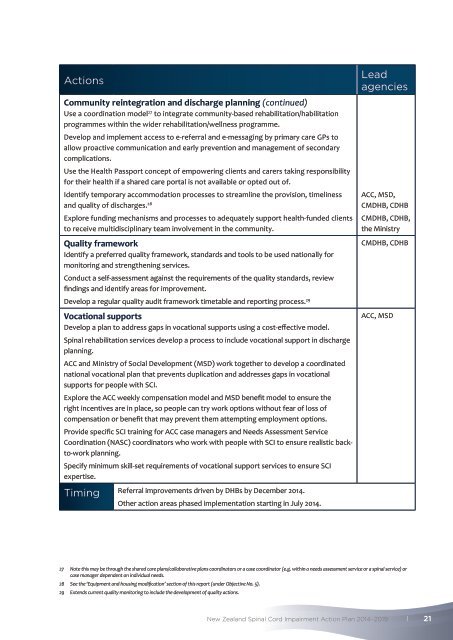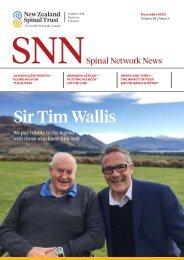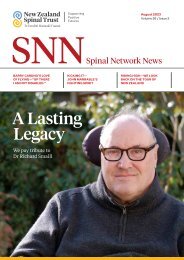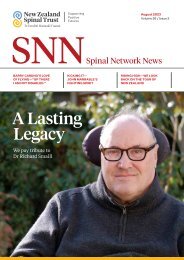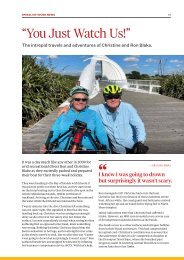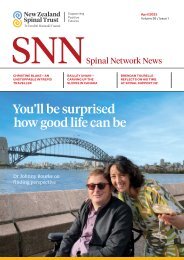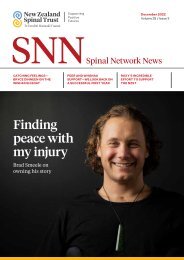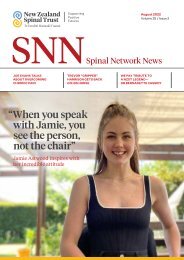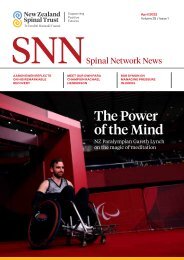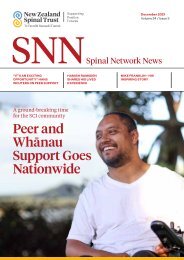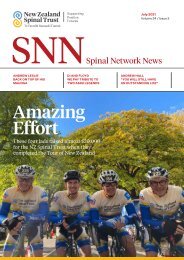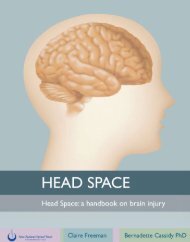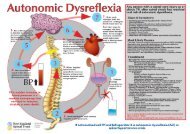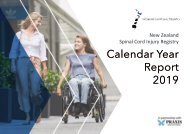SCI Action Plan 2014-2019
Create successful ePaper yourself
Turn your PDF publications into a flip-book with our unique Google optimized e-Paper software.
<strong>Action</strong>s<br />
Community reintegration and discharge planning (continued)<br />
Use a coordination model 27 to integrate community-based rehabilitation/habilitation<br />
programmes within the wider rehabilitation/wellness programme.<br />
Develop and implement access to e-referral and e-messaging by primary care GPs to<br />
allow proactive communication and early prevention and management of secondary<br />
complications.<br />
Use the Health Passport concept of empowering clients and carers taking responsibility<br />
for their health if a shared care portal is not available or opted out of.<br />
Identify temporary accommodation processes to streamline the provision, timeliness<br />
and quality of discharges. 28<br />
Explore funding mechanisms and processes to adequately support health-funded clients<br />
to receive multidisciplinary team involvement in the community.<br />
Quality framework<br />
Identify a preferred quality framework, standards and tools to be used nationally for<br />
monitoring and strengthening services.<br />
Conduct a self-assessment against the requirements of the quality standards, review<br />
findings and identify areas for improvement.<br />
Develop a regular quality audit framework timetable and reporting process. 29<br />
Vocational supports<br />
Develop a plan to address gaps in vocational supports using a cost-effective model.<br />
Spinal rehabilitation services develop a process to include vocational support in discharge<br />
planning.<br />
ACC and Ministry of Social Development (MSD) work together to develop a coordinated<br />
national vocational plan that prevents duplication and addresses gaps in vocational<br />
supports for people with <strong>SCI</strong>.<br />
Explore the ACC weekly compensation model and MSD benefit model to ensure the<br />
right incentives are in place, so people can try work options without fear of loss of<br />
compensation or benefit that may prevent them attempting employment options.<br />
Provide specific <strong>SCI</strong> training for ACC case managers and Needs Assessment Service<br />
Coordination (NASC) coordinators who work with people with <strong>SCI</strong> to ensure realistic backto-work<br />
planning.<br />
Specify minimum skill-set requirements of vocational support services to ensure <strong>SCI</strong><br />
expertise.<br />
Timing<br />
Referral improvements driven by DHBs by December <strong>2014</strong>.<br />
Other action areas phased implementation starting in July <strong>2014</strong>.<br />
Lead<br />
agencies<br />
ACC, MSD,<br />
CMDHB, CDHB<br />
CMDHB, CDHB,<br />
the Ministry<br />
CMDHB, CDHB<br />
ACC, MSD<br />
27 Note this may be through the shared care plans/collaborative plans coordinators or a case coordinator (e.g. within a needs assessment service or a spinal service) or<br />
case manager dependent on individual needs.<br />
28 See the ‘Equipment and housing modification’ section of this report (under Objective No. 5).<br />
29 Extends current quality monitoring to include the development of quality actions.<br />
New Zealand Spinal Cord Impairment <strong>Action</strong> <strong>Plan</strong> <strong>2014</strong>–<strong>2019</strong><br />
I<br />
21


